Our Outposter Contribution Cup truly runs over this month! As you know, nothing makes us as happy as receiving contributions from you, our beloved Outposters. As Outposters, you are automatically superior online movie beings, which is why your opinions are simply more valid than others when it comes to movies, TV, streaming, and entertainment in general. You basically are As Good As It Gets (do you see what we did there?)
Share your superior opinions with your fellow Outposters, and revel in their adoration, by writing to us at [email protected] and taking your rightful place among the legends.
Just like Mhatt here. A long time Outposter who has contributed before. He wants to talk to you about a very specific movie.
When Was Hollywood As Good As It Gets?
Hello Friends and Neighbors. As many of you have noticed we are nearly nipple deep into October which has traditionally been around when we start to get a decent idea of the 2024 films that are likely to be recognized with one of the industry’s many notable awards, the granddaddy being the Oscars; the winners of which are generally being telegraphed by now.
You may have also noticed there has been little to no hype for anything this year – which matters to those of us who genuinely enjoy Oscar night. Not that I think it really matters who wins what is increasingly really a contest between the more ruthless and relentless marketing teams which, in recent years have taken to bulk “influencing” the major nominations.
Though a shrewdly unfair practice, it does come in handy because by the time the first award darlings’ names are whispered. Sometimes beginning at Cannes, definitely something out of TIFF in September, and almost definitely by around the end of November with the New York Film Critics Circle awards, we have a reasonably solid idea of who and what will be recognized by the Academy.
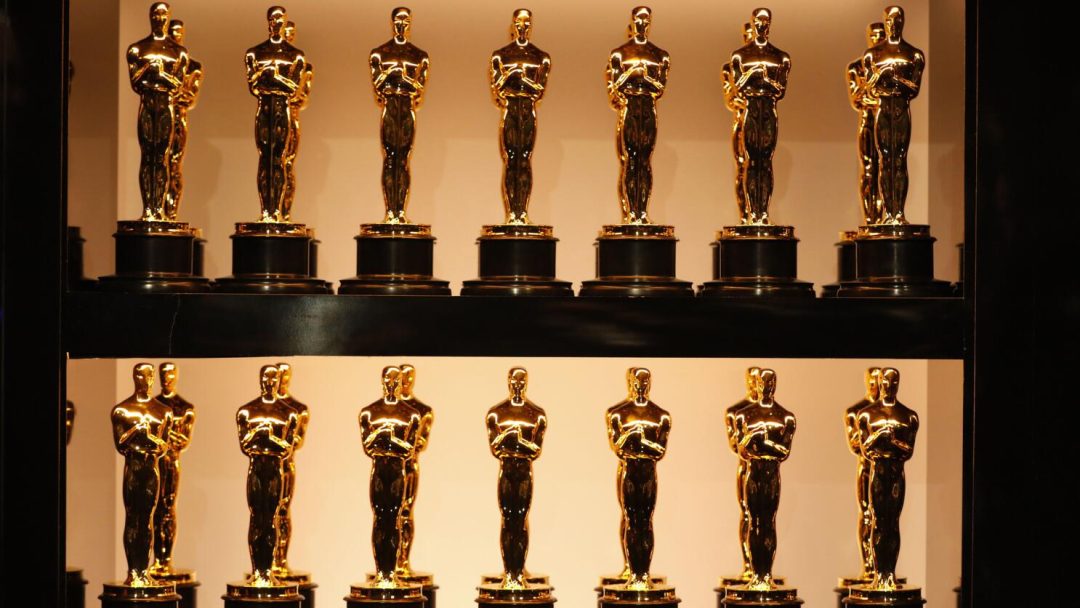
All terribly exciting and exceedingly pointless but hey, at least they sometimes acknowledge quality, harkening back to when good movies made money and got critical acclaim, in a time before audience shaming, race, and gender baiting, a time when people made good movies, or at least gave a fuck enough to try.
Can anyone even name a contender for this year yet?
There have been some murmurings, but nothing communicating any real confidence by the gold plating diggers. These usually draw an interesting comparison between the state of current Hollywood media with the crucial point in the early 90s when the Academy Awards turned its gaze away from the mainstream fare to the more indie and art house side of things.
Not only were some seriously good movies recognized, but the careers of nobody auteurs were thrust forward into the sustaining glow of Hollywood, proving that the elevation of outsider cinema was inevitable if the industry was to remain relevant.
And so it did.
A glimpse at any year of the 90s has at least one classic film released to critical, public, and box office success that carried through to awards season. A wave that grew, and in many ways crested, in the year 1997. Movies recognized at the 1998 Academy Awards were some of the finest films made, not only that year, but perhaps ever.
We saw Titanic, L.A. Confidential, Ulee’s Gold, Good Will Hunting, Wag the Dog, The Apostle, Boogie Nights, Amistad, Men in Black, Deconstructing Harry, The Full Monty, Con Air, and Air Force One all recognized by the Academy. Damn!
It had to be something like the epic event that was Titanic to dominate that year’s award ceremonies. Of course, each film here is worthy of its own article but what I have been allowed to do today is to highlight what I think is one of the best pure screenplays ever produced.
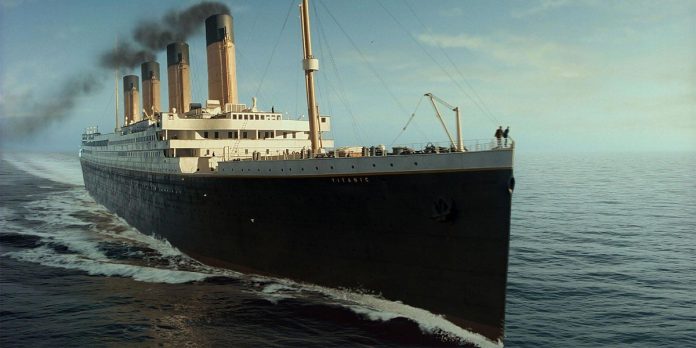
One so good that all the excellently cast actors had to do was show up. Then they naturally deliver career-defining performances, but also elevate the pedigree material. Written by Mark Andrus and James L. Brooks, who also directed, I present a Retro Review of one of perhaps the most appropriately ostentatiously titled films – As Good As It Gets.
As Good As It Gets: The Story
Jack Nicholson plays Melvin (“Absolute horror of a human being”) Udall against Greg Kinnear’s Simon (“the Fag”) Bishop who are neighbors in a luxe but cozy Manhattan apartment building. Yeardley Smith (“Simon; you’re broke”) and Cuba Gooding Jr. (“I am an art dealer”) are supporting characters in Simon’s art career.
Udall is a novelist with severe OCD, triggered almost violently by the undisciplined yet adorable canine companion of Simon, a Brussels Griffin terrier named Verdell.
Melvin revels in the anguish of the dog’s temporary disappearance, giving us a quick and thorough impression of a charming yet horrifying man with the smooth and easy ability to terrorize, bully, and push around anyone he encounters.
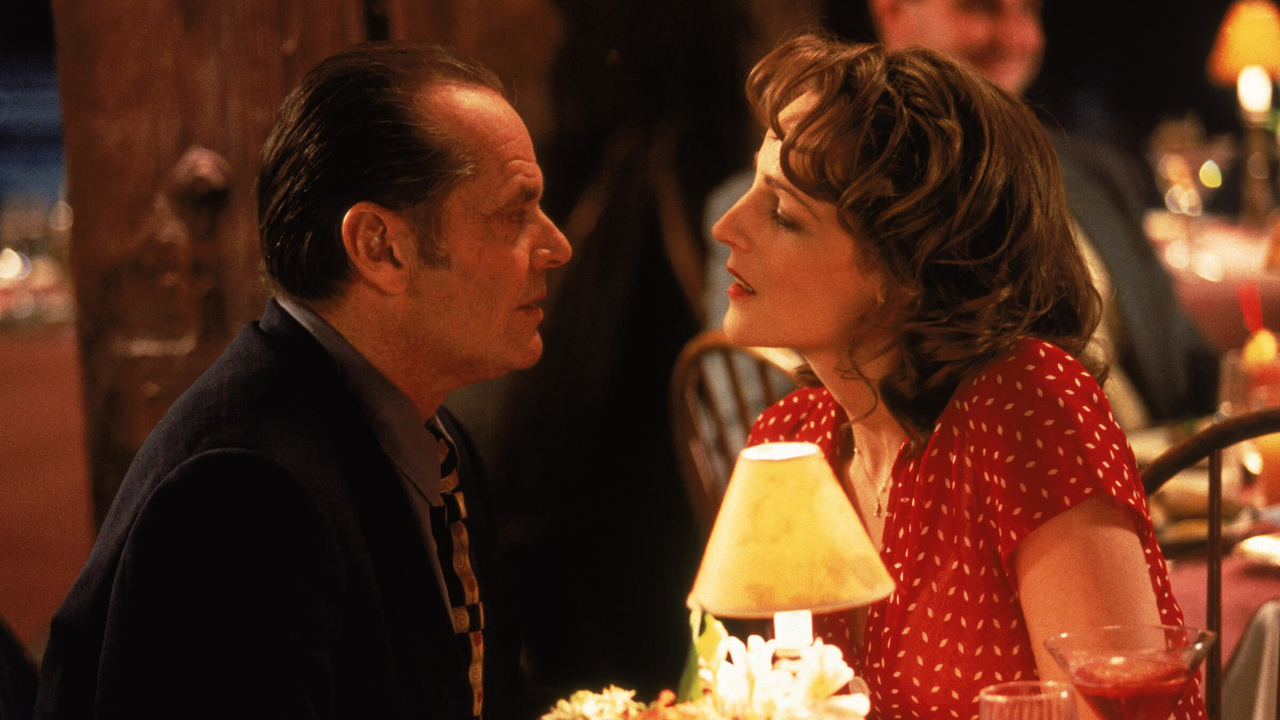
Well, almost anyone. Enter Carol the Waitress (Hunt) who humors Melvin’s quirky (eating only with plastic cutlery) loud mouth and sometimes racist presence, revealing her to be either a truly kind soul or just a desperate Mother doing what it takes to support her deathly asthmatic son Spencer whom she raises with her Mother (Knight) in Brooklyn.
After a model cum hustler sets Simon up for the mother of all beatings, sending his life into a spiral, Melvin is sucked into looking after nemesis Verdell. This forces him to crack open not only his one-man asylum but also his heart, which no one believes exists except for the art dealer whose childhood spent in hell has gifted him with the ability to see through the bully’s crusty veneer to the fragile soul inside.
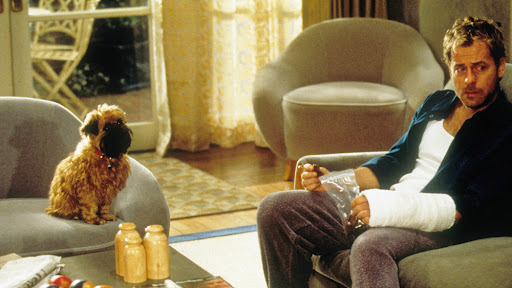
The spiral grows to consume Carol and the trio embark on a literal and metaphorical journey to find what is most important to themselves. Everyone here is a complex, charming, flawed, and loveable character with a clear and honest arc who grows not just by necessity but by the circumstances that thrust them together.
In less capable hands it could be hokey and trite, but framed against some delicious backdrops of New York in blossom and an under-exposed side of Baltimore, you are never subjected to anything less than emotional sincerity, as tortured and sad as it might be.
Culminating in a road trip to Baltimore, in which new emotional ground is found and broken on the road back, and the various jostling back into Manhattan sees the weight of emotion is shuffled onto Melvin who for, one can assume the first time in his life, realizes sometimes other people’s needs exist and not just in service of his own.
The Screenplay
There is an adage that if a screenplay is good enough you could drop it in the park and it would be picked up and produced, this is a textbook example.
Jack Nicholson is the pivot this film spins on, he is so snugly in his wheelhouse he doesn’t make a mistake in this film, he’s terrible and scary and charming and funny and someone you really loathe to root for but damned if he doesn’t earn it.
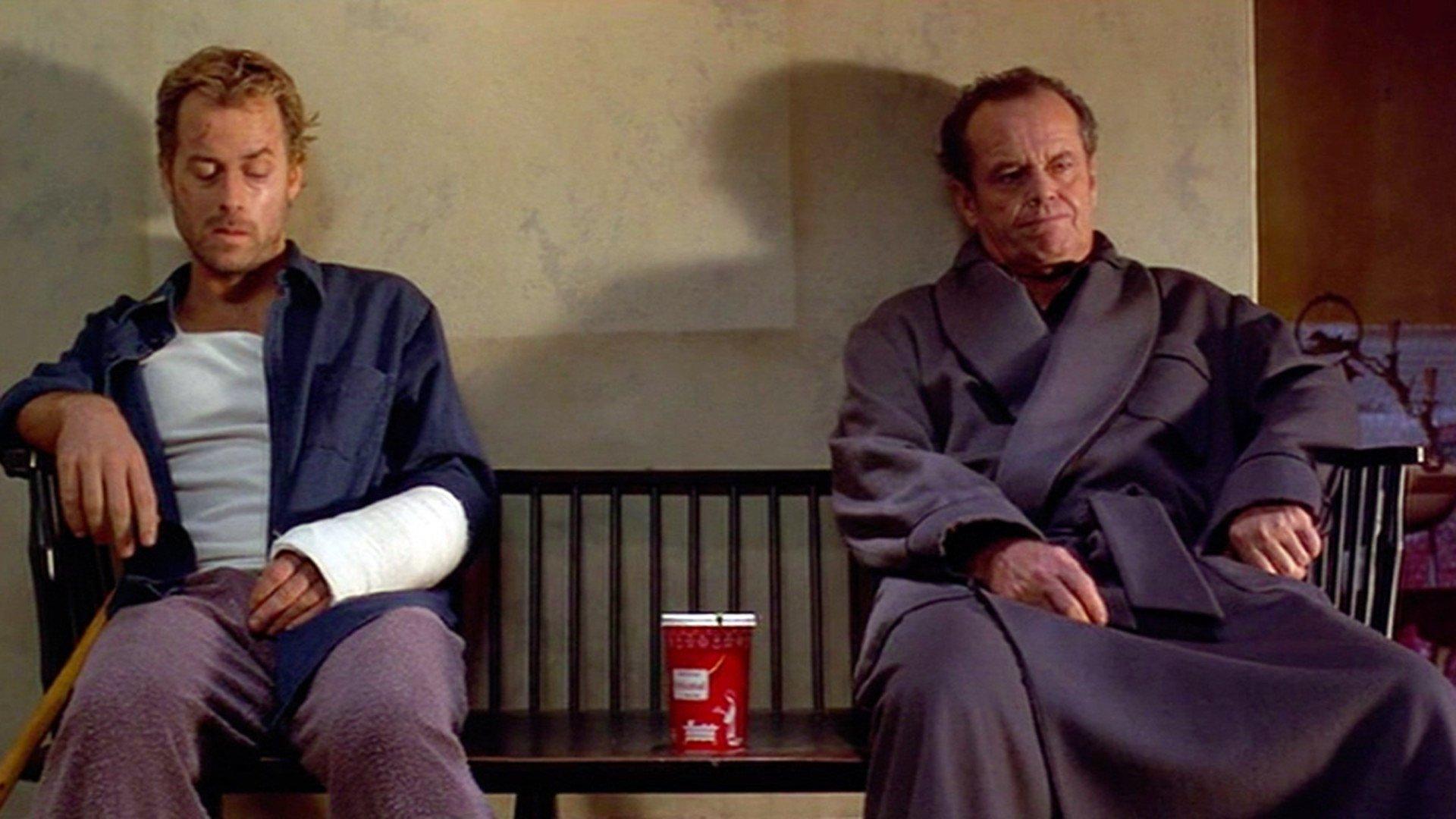
The dialogue throughout is clever but honest and real, the characters experience genuine growth, and alliances are forged not out of the desire for a palatable narrative but through circumstances where kindness is allowed to outshine selfishness. While awaiting acceptance to law school, Mark Andrus took up creative writing which led to him penning what was originally entitled Old Friends. This was picked up by producer Laura Ziskin (Pretty Woman, the Tobey Maguire Spider-Man trilogy).
Early production had it circled by Kevin Kline, Ralph Fiennes, and Holly Hunter before it was picked up by Brooks and retitled, rewritten, and shopped around with Geoffrey Rush and John Cusack as rumored candidates for the Simon Bishop character, before it went to the correct choice in the usually pretty safe Kinnear.
Cameos by familiar faces Harold Ramis (Ghostbusters), Bryan Doyle-Murray (Wayne’s World), Shane Black (Predator Prime, Iron Man 3), Lawrence Kasdan (The Empire Strikes Back), Julie Benz (Dexter) Jamie Kennedy (Malibu’s Most Wanted), Missi Pyle (Soccer Mom), Todd Solondz (Writer/Director; Indie guru) and Maya Rudolph (SNL) are solid assists on the collective high-class production which represents a career highlight for everyone involved.
As well as earning Nicholson his third, and apparently final, Best Actor Oscar win, honors went to Helen Hunt for Best Actress, who was up to this point primarily a television star, see what I said about just showing up? As well as nominations for Best Supporting Actor for Greg Kinnear, who lost to Robin Williams, Brooks, and Andrus were also nominated.
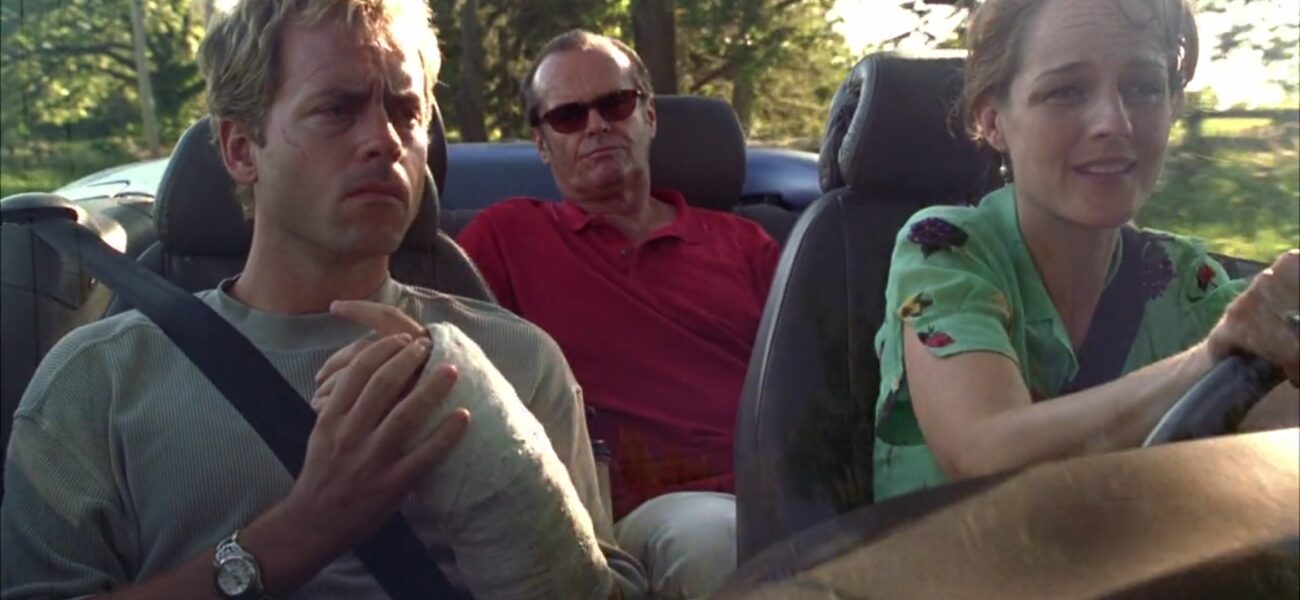
The Best Original Screenplay award was lost to the ultra-fine Good Will Hunting, with the movie finally losing out on Best Picture to Titanic, which grabbed its 11th and still record-tying win of the night.
Since then, Hunt and Nicholson have received one more Oscar nod each, The Sessions (2013) and About Schmidt (2003) respectively but Andrus’s career hasn’t delivered anything nearly this inspired.
Despite the pretty solid Life As A House (2001) starring Hayden Christenson and Kevin Kline, the, admittedly solid, adaptation of The Divine Secrets of the Ya-Ya Sisterhood (2002) and the not unwatchable, Lindsay Lohan / Jane Fonda vehicle Georgia Rule (2007) and most recently 2019’s parenting drama Otherhood, nothing touches what he did here.

With respect to Brooks and his long, extremely notable, and diverse career, I consider this to be the last excellent film he was front-line talent on.
Outside a couple of swings with the Adam Sandler Tea Leoni comedy Spanglish (2004), and a reteam with Nicholson for How Do You Know (2010) with Reese Witherspoon, Paul Rudd, and Owen Wilson, he hasn’t really made anything exceptional. Perhaps his upcoming Ella McCay (2025), where he does the trifecta again, will be a refreshing pivot – if only we could get Jack (I mean the Jack), back.
However, no matter what has come since, 1997 remains a monumental year for Hollywood, a definite peak for everyone involved here, certainly for the Oscars which still holds the record with 87 million viewers, a year where As Good as It Gets remains an appropriate overall descriptor and not just the name of a damn good film.




